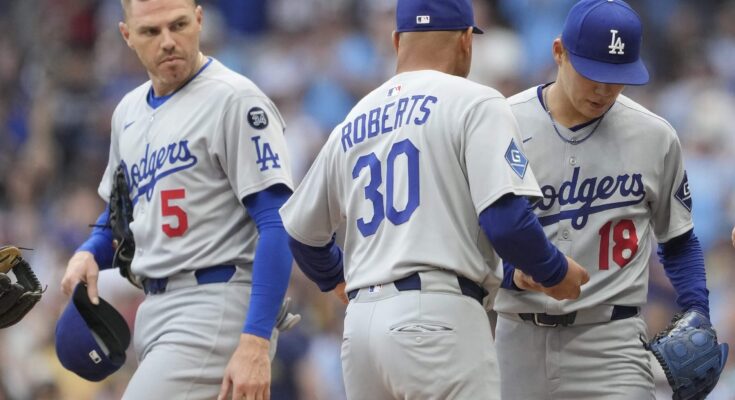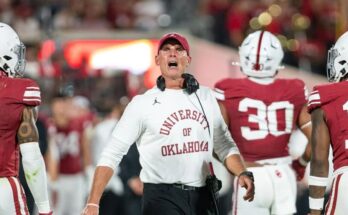Dodgers Drop Six in a Row — Fans Report Missing Wins, Sanity, and the Year 2019
It’s been a long time since the Los Angeles Dodgers looked this… mortal. The franchise that’s become a perennial powerhouse, the juggernaut that steamrolls through summers and grinds its way deep into Octobers, suddenly finds itself in a place few could have predicted and fewer are enjoying. With six straight losses now hanging around their necks like a cursed necklace, the Dodgers are trudging through their worst losing streak since 2019 — a statistic that reads more like a glitch in the matrix than a routine sports update. Parsing through this mess isn’t just a scoreboard exercise — it’s a test of patience, memory, and maybe a little therapy.
The streak didn’t begin with fireworks or panic. It crept in quietly, disguised as a bad day at the ballpark. One loss. A shrug. Maybe a bullpen misfire here or an off night at the plate there. But then came the second, and then the third, and suddenly, the Dodgers were spinning in a cycle that kept repeating itself with unsettling familiarity. Errors became more visible, the bats cooled, the late innings grew tense, and the vibes — whatever intangible force fuels momentum in baseball — evaporated.
By the time the fifth and sixth losses arrived, any notion that this was just a random blip had vanished. This wasn’t a fluke; this was a full-on funk. For fans and players used to seeing this team climb atop the standings like it’s their birthright, watching the Dodgers flail around like they’re auditioning for a tragic comedy is both surreal and frustrating. And what makes it worse? This kind of thing hasn’t happened in over four years. The last time Los Angeles lost six straight games, TikTok was still a curiosity and people thought “Baby Yoda” was a meme, not a marketing strategy.
So what exactly is going wrong? That’s the million-dollar (or, more accurately, multi-hundred-million-dollar) question. Because on paper, this team is built to dominate. The roster remains loaded with elite talent. The payroll suggests excellence. The expectations have barely changed. But baseball isn’t played on spreadsheets, and for all the stats and algorithms in the front office’s arsenal, there’s no metric that explains how a team can collectively misplace its mojo.
The problems start with pitching, which has gone from dependable to dicey. Starters aren’t going deep enough, and the bullpen, already stretched thin, looks increasingly fragile. The dependable arms of past seasons are either injured, inconsistent, or overwhelmed. The ninth inning — once a place where games went to die in the Dodgers’ favor — now feels like a haunted inning full of unwelcome surprises.
Then there’s the offense, which has been a roller coaster without the thrill. One night they’ll scatter a few hits without a clutch moment in sight; the next, they’ll load the bases and promptly strand everyone like forgotten luggage. This team that once crushed opposing pitchers with terrifying predictability now struggles to string together enough quality at-bats to mount a serious threat. The spark is missing. The rhythm is off. Even the big names are pressing, swinging at pitches they’d normally spit on and grounding into outs that seem scripted by their worst critics.
Add to this a handful of defensive lapses and untimely mistakes, and you’ve got yourself the anatomy of a losing streak. It’s not one massive breakdown, but a thousand tiny paper cuts that bleed into a disaster. The kind of errors that championship-caliber teams usually avoid are now creeping into the Dodgers’ play, turning tight games into heartbreaks and close calls into walk-offs — for the other guys.
And perhaps the most jarring aspect of all of this is just how uncharacteristic it is. This is the Dodgers. They don’t just win games; they smother opponents with depth, smarts, and execution. They rarely, if ever, look rattled. Yet now, the cracks are visible. The calm, collected confidence that once defined them has been replaced by something unfamiliar: doubt.
That’s not to say this is a collapse. Six games, even six straight losses, don’t define a season — especially not in the long, grinding marathon that is Major League Baseball. But they do raise eyebrows. They do shift narratives. They do force everyone — from the dugout to the front office — to ask harder questions and confront uncomfortable truths. In this case, the truth is simple: the Dodgers have lost their edge, at least for the moment.
The silver lining, if you can call it that, is history. The 2019 Dodgers rebounded from their losing streak and went on to post a 106-win season. Of course, that team also suffered a quick postseason exit, which still haunts fans who don’t find regular-season dominance comforting unless it leads to rings. Still, it shows that this franchise knows how to weather storms, how to recalibrate and recover.
What matters now is how the Dodgers respond. Losing six straight is bad. Losing your identity in the process would be worse. Baseball is as much about mentality as it is about mechanics, and right now the Dodgers must rediscover who they are — not just on the stat sheet, but in the dugout, in the locker room, in the way they carry themselves on the field.
The veterans need to lead. The rookies need to contribute. The coaching staff needs to shake the rust off the game plan. Whether it’s a lineup shuffle, a bullpen reshuffle, or just some old-fashioned chewing out behind closed doors, something has to change. The good news is, the calendar hasn’t turned to September yet. There’s time — plenty of it, in fact — to turn things around. But the clock has started ticking, and the rest of the league smells blood.
Opposing teams no longer walk into a series against the Dodgers with dread; they see opportunity. That’s perhaps the most damning part of this slump — the erosion of the fear factor. The aura that once made the Dodgers the scariest team in baseball has dimmed. And in sports, perception becomes reality very quickly.
But maybe that’s what this team needs. Maybe this stretch of failure will strip away the assumptions and remind everyone inside that clubhouse that greatness isn’t guaranteed. That dominance must be earned, every game, every pitch. That the difference between a dynasty and a disappointment can be as simple as whether a team learns from adversity or drowns in it.
So now, as the Dodgers stare down the next few games, the challenge is clear: stop the bleeding, rediscover the fundamentals, and win — not for the record books, not for the payroll, but for the pride. Baseball doesn’t care about pedigree. The game is cruelly democratic that way. You can have the best roster in the world and still lose six in a row if you forget that every team wants to knock you off the pedestal you built for yourself.
And make no mistake, the Dodgers built that pedestal. They earned their dominance. But now they have to defend it, one game at a time. Because right now, the streak stands at six. And nobody wants to find out what seven feels like.



